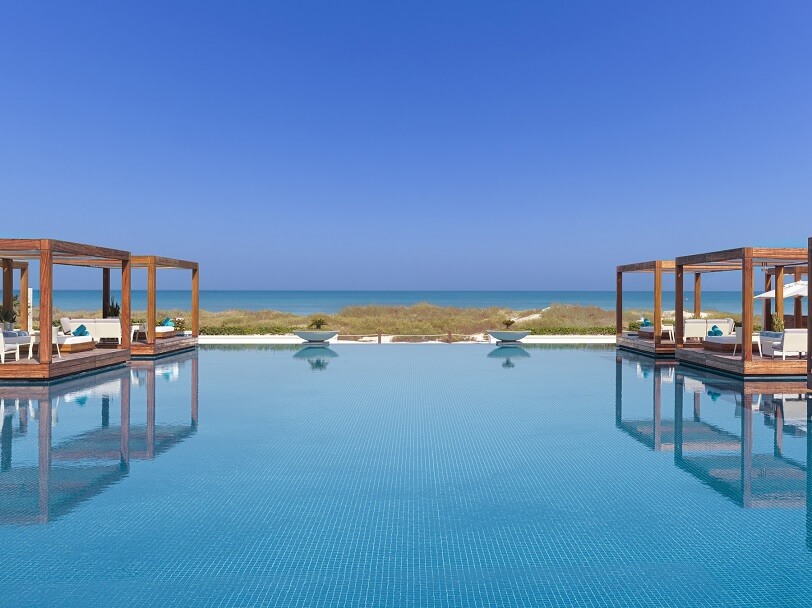Table of Contents
Besides being famous for being home to the “City of Gold”, which is Dubai, the United Arab Emirates (UAE) also boasts a capital—that’s Abu Dhabi—known for its many historical and cultural gems. Other emirates, namely Sharjah, Ajman, Ras Al Khaimah, Umm Al Quwain and Fujairah, also offer unique experiences to both local and foreign tourists.
Besides the palaces, museums, adventure parks, natural scenery and culinary offerings available across the country, the different emirates have pristine beaches that UAE residents and visitors frequent. But even though the UAE is quite modern and is populated by a lot of expats from all over the globe, there are still certain rules people need to adhere to when going to the beach.
Tourists, especially, need to understand that Islam is the state religion. So as a tourist (or an expat working and living in the UAE), you need to be culturally and religiously sensitive throughout your stay.
If you’re an avid swimmer and beach-lover planning to visit the Saadiyat Beach Club in Abu Dhabi, for example, be sure to consider local sensibilities. To avoid being penalised and to ensure you enjoy your UAE holiday, keep the following rules in mind when going to the beach:
Also Read: Best Time to Travel to Dubai
5 Important UAE Beach Rules
1. No skimpy clothing
Many beachgoers in the country often get confused about what to wear. Since the country bears strong Western influences mixed with traditional Muslim culture, the line between what is appropriate and what is not can be quite confounding.
When planning your beach trip, make sure to pack clothing that will keep you comfortable and cool without offending local traditions. Wearing swimming attire you would normally put on in the beaches of São Paulo or Miami, for example, would be fine if you are swimming in a private beach hotel where it is allowed or where specific dress codes are clear cut.
However, public and family beaches would entail covering up a bit more as a sign of respect for other beach-goers and local traditions and values.
Private Beaches
There are plenty of well-kept beaches in the UAE and there are many private ones. To avail of these beaches, you may be required to pay a daily fee, have a membership, or be a resident.
Private beaches are more lenient when it comes to beach attire and may tolerate what you normally wear on the beach in your home country. The same thing goes for hotel pools in general.
However, it’s not advisable to go nude or topless when swimming. For your convenience, consider booking your accommodation at a beach hotel so you no longer have to lug your beach items and travel far to enjoy the sea.
To ensure that you won’t be breaking any rules, don’t forget to ask the hotel in advance about their beach or pool regulations.
Public Beaches
If you choose to visit or swim in one of the country’s public beaches, which are also popular among expatriates and locals, remember that going to one means dressing modestly even when swimming. Wearing shorts or swimsuits for women and no shirts for men may attract a great deal of unwanted attention.
Remember that beachwear is for the beach only. This means wearing your beachwear isn’t acceptable on your way to and from the beach. Also, consider these reminders:
For men:
- Y-fronts or boxer shorts aren’t considered swimming trunks.
- Board shorts are okay as long as they’re not budgie smugglers or short tight ones.
- Men also need to be aware of ladies’ days as they will not be allowed to use the public beach.
For women:
- Bikinis and one-piece swimsuits are okay for swimming but always ensure you cover up when already out of the water or lounging at the beach.
- Avoid wearing white bikinis as they look similar to white underwear and may appear indecent.
- Topless bathing is strictly not allowed and is illegal anywhere in the UAE.
To avoid unwanted attention and to show respect, put on some clothes or a top to cover your swimwear when drinking or eating meals away from the beach or pool. There’s no need to cover yourself entirely, as shorts (of a decent length) and sundresses are widely worn in the country.
For women who are fond of wearing spaghetti-strap dresses or tank tops, be sure to bring a scarf or shawl to cover the shoulders.
Also Read: Desert Safari Dubai Adventure
2. No beach barbecues and bonfires
No matter how much you look forward to having some freshly grilled meat, barbecues on the beach are not permitted for safety reasons, unless it’s stated as an allowed activity on a beach sign.
However, there’s no need to fret, as there are usually some designated areas near the beach where you can grill safely. Also, when gathering with friends, you may also want to check your desire to start a bonfire as it’s also prohibited for safety purposes.
Neglecting beach safety regulations may cause you to incur fines.
3. No taking of photos without prior consent
It’s natural for a tourist to want to take as many photos of their holiday as possible.
Unfortunately, you may want to take it slow on public beaches. This is because it’s illegal to take pictures of an individual on the beach without their consent.
Even if you are only taking pictures of the general view or scenery, be sure to not have human forms in it; or at least, seek the permission of people if they happen to be inside the frame.
The aim of this regulation is to make beachgoers feel relaxed and enjoy their privacy. To abide by this rule, make it a habit to ask permission before you start taking photographs.
4. No alcoholic drinks and getting inebriated
Alcohol is strictly forbidden in public places, including beaches. Alcohol is available in the country, but you have to buy and consume them in licenced venues such as hotel bars and beach clubs.
Being drunk in public is not allowed. Also, take note that the legal age for drinking alcohol in the UAE is set at 21. Different emirates may also have their own rules concerning the sale of alcohol, so it’s recommended to ask your hotel first if you want to purchase or drink alcohol outside its premises.
Of course, opting to purchase alcohol online and getting it delivered, or enjoying a cocktail in your hotel are still your best bet.
5. No overnight sleeping on the beach
The thought of setting up a tent near the coast is exciting. However, you can’t do this on a public beach without a permit. The sea may look calm, but there are rip tides and strong currents which can be quite dangerous, which is precisely why this rule is being enforced.
At first, things may seem restrictive in the UAE. However, the country is known for being one of the most tolerant of other nationalities and cultures. Also, if you follow the aforementioned rules, there’s no reason for you to not enjoy your beach escapade and the rest of your holiday in the UAE.
To get easy beach access, consider booking a stay and play hotel with a sea view and a private beach so you can hit the waves anytime you feel like it.




